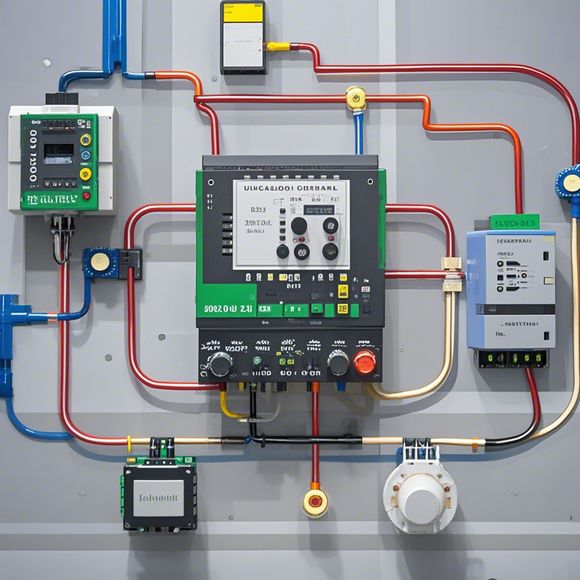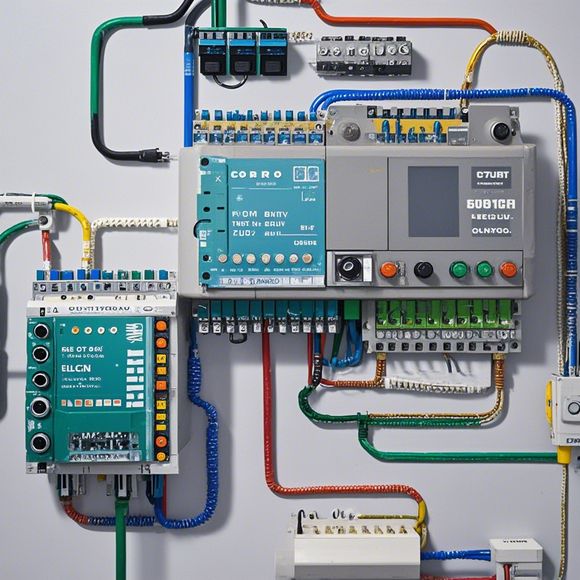What is a PLC Controller?
A PLC controller, also known as a Programmable Logic Controller, is an electronic device used in industrial and manufacturing environments to control and automate various processes. It is designed to receive input signals from various sensors, analyze them, and then output commands that can be sent to other devices or systems to perform specific functions.PLC controllers are highly versatile and can be programmed to perform a wide range of tasks, including controlling machinery, monitoring equipment, and optimizing production processes. They are often used in industries such as manufacturing, construction, and automation, where they can help improve efficiency, reduce downtime, and ensure high levels of accuracy and reliability.Overall, a PLC controller is a critical component in today's world of automation and industry-level control. Whether you're working on a large-scale project or simply maintaining existing machinery, having the right PLC controller can make the difference between success and failure.
In today's world where technology plays a significant role in almost every aspect of business, the use of industrial control systems has become more prevalent. One such system that stands out for its efficiency and reliability is the Programmable Logic Controller (PLC). So, what exactly is this device, and how can it benefit your business? Let's delve into the world of PLC controllers and see how they can enhance your operations.
A programmable logic controller (PLC) is a powerful computer system designed to manage and control industrial processes. It is an integral part of manufacturing and automation, making it crucial for businesses looking to streamline their operations and increase efficiency. The key features of an PLC are its ability to store instructions, which can be reused multiple times, allowing for precise control of various machines and systems.
The first step in understanding PLC controllers is recognizing their importance in manufacturing industries. These systems are used in various industries, including machinery, automotive, chemical, and pharmaceutical. In machinery sectors, they are responsible for controlling the movement of machines and ensuring smooth operation. For example, in the food industry, PLCs can be used to control ovens, conveyors, and sorting machines, leading to improved quality control and faster production time.
Automotive industries rely heavily on PLCs to control the complex systems found in cars and trucks. They ensure optimal performance by monitoring various parameters such as engine speed, fuel consumption, and tire pressure. This helps maintain safety, optimize performance, and reduce costs. Additionally, the PLC in the automotive industry allows for easy integration with other systems, such as infotainment systems and safety features.

In the chemical sector, PLCs are critical in controlling the temperature, pressure, and flow of raw materials and products. They help ensure the safety of workers and prevent product contamination during processing. Furthermore, in the pharmaceutical industry, PLCs play a vital role in controlling sterilization processes and monitoring drug release rates.
The benefits of using PLC controllers are numerous. Firstly, they offer high flexibility and customization, allowing businesses to tailor their systems to meet specific needs. Additionally, PLCs offer low cost per function, making them a cost-effective solution for businesses. Furthermore, their ease of integration with other systems makes them ideal for modern manufacturing environments.
One of the most significant advantages of PLCs is their ability to monitor real-time data, providing businesses with valuable insights into their operations. This information helps them identify potential issues before they occur, enabling them to respond quickly to any disruptions or problems. By analyzing data from sensors and other equipment, businesses can optimize their processes, improve efficiency, and reduce waste.
Another advantage of PLCs is their ability to handle complex tasks with precision. Unlike traditional control systems, PLCs can perform calculations and make decisions based on real-time data. This enables them to control machines and systems more accurately, leading to improved quality and reduced downtime. Additionally, PLCs offer fault tolerance, ensuring reliable operation even when there are errors or failures.
When it comes to selecting a PLC controller, it is essential to consider several factors. Firstly, determine the number of inputs and outputs needed to control the machines or systems you want to monitor. This will help you choose a PLC that has enough capacity to support your needs. Next, assess the complexity of your process and determine if you need a basic PLC or a more advanced one with additional features like network connectivity and programming capabilities.

It is also essential to consider the cost of each option. While some PLC controllers are more expensive than others, they often come with additional features that can save you money in the long run. Additionally, research the reputation of different manufacturers and read customer reviews to ensure you choose a reputable brand that offers excellent customer support and technical support.
Finally, don't forget to consult with experts or professionals who have experience working with PLC systems. They can provide valuable advice and guidance to help you select the right PLC controller for your specific needs.
In conclusion, PLC controllers are a powerful tool for managing industrial processes. With their ability to monitor real-time data, handle complex tasks, and offer low cost per function, these controllers have become increasingly important in many industries. Whether you're in manufacturing, automotive, chemical, or pharmaceutical fields, investing in a PLC controller can help you achieve greater efficiency, productivity, and profitability. So why not explore the options available to you and find the perfect PLC controller to meet your business's needs?
Content expansion reading:
Articles related to the knowledge points of this article:
PLC Controller Selection Guide for Foreign Trade Operations
PLC Controller for Manufacturing Automation
PLC Programming for Automation Control in the Manufacturing Industry
The Role of Programmable Logic Controllers (PLCs) in Foreign Trade Operations
Connecting a PLC Controller to Your Computer
PLC Controllers: A Comprehensive Guide to Understanding Their Prices